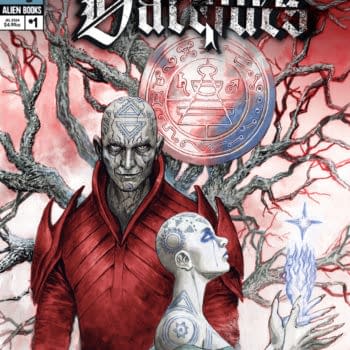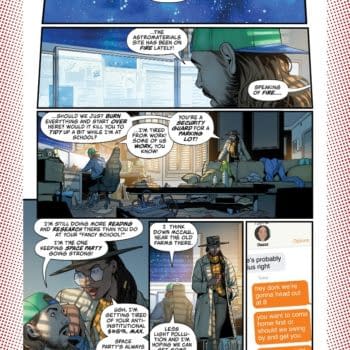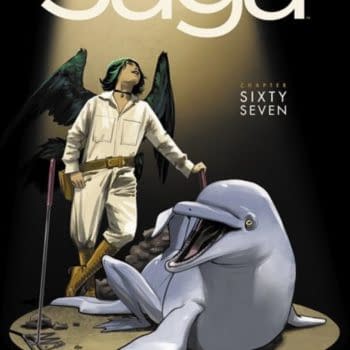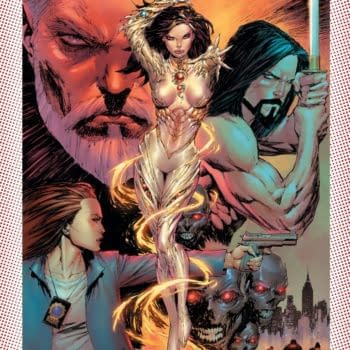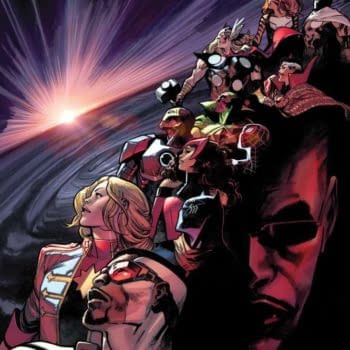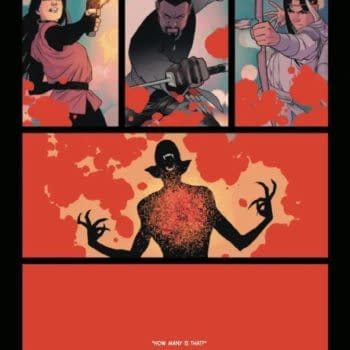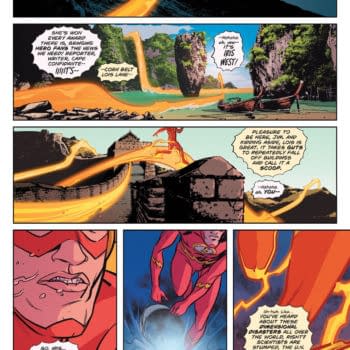Posted in: Comics | Tagged: Comics, dc, marvel
Five Ways The Comics Industry Could Dramatically Change In 2012. Aside From Digital.
Last week, Mark Millar was saying that he and Bryan Hitch had been chatting very indiscriminately about a big change that was coming in 2012 for comics aside from digital – but that he couldn't say any more.
"the industry, as we all know it, about to go through some massive changes unlike anything we've seen since I was a child. I don't just mean digital (though that's obviously a factor). But massive, very interesting stuff going on that's going to change things quite radically for people working in the industry and anyone reading the books. The next 12 months is looking like a comic book revolution. Some of it's good and some of it's bad, but we're looking at a very different industry a year down the line in terms of where people are going to be working, what they're getting paid, etc."
Now there have been a lot of theories over the years about big big changes that could affect the comics industry, for good or for bad… here are five current faves from people I've been chatting to.
1. Diamond Goes Down
It's no secret that Steve Geppi, 100% owner of Diamond Comic Distributors and Diamond Book Distributors is in debt, to the extent that his entire wealth was recently estimated at one million dollars. Given that Diamond is estimated into the eight figures in value, that indicates a lot of debt riding on the man – and the company. And month by month, sales through Diamond had been going down, and companies have moved their trade paperback and hardcover collections to bookstores away from Diamond. The New 52 has helped swing in the other direction recently, but what is the long term picture looking like? With content starting to shift to digital, will Diamond's digital service be able to get enough of a land grab?
And if there were a bankruptcy, the likes of DC or Marvel could step in. But would they? Would one company allow the other to distribute their comics, and have advance knowledge of the others' publishing plans? Who else would even contemplate such a thing? ComiXology, say? Or would the marketplace find itself riven, with the loss of economies of scale that would bring. For all the criticism, Diamond has proved itself a remarkably efficient way for any publisher in the US to get a reasonably selling comic into any comic store that wants it. On Wednesday. As the MArvel Heroes World decacle taught us, it isn't that easy.
2. The Major Companies Are No Longer Embarrassed About Social Fundraising
In France, the biggest comic book publisher – and the third biggest publisher full stop – launched a social funding element to its publisher plans. Boom, IDW, Image, are all happy to publish works funded by Kickstarter and Indiegogo. If Marvel and DC take the plunge, big time, allowing fans and, more importantly, activists to directly fund company books at conception and creation, we could see a transformation in the work published by the big boys. There is an embarrassment factor, the idea that certain projects aren't good enough to earn confidence from a publisher so have to go cap in hand. But shame has never bothered Marvel that much.
And there's also a growing audience who are just buying Kickstarter and Indiegogo books…
3. A List, B List, Outsource
Already DC and Marvel have brought in different pay scales for the same job working on different comics for letterers, colourists and inkers, with the suspicion that pencillers and writers are next. Already those with exclusive contracts are being moved off books that may not have the sales to justify those exclusive perks. But with sales on some books dropping so low, it seems that matching pay to sales more directly may become a more popular choice.
Then there's outsourcing. Why should editorial duties be carried out in expensive Manhattan or Burbank offices? Aren't there cheaper places, couldn't much of the job be done by telecommute? Can't you feel Isaac Perlmutter's antennae twitch at the thought – although he does like to come into his Manhattan office. But then there's the big one – why not licence publishing the comics to someone else and just rake in the licensing fees? DC were planning to do it with Marvel in the eighties, I'm sure there are many bodies who would like to take it on. Currently the big companies are still attached to their Bullpen/freelancer system. But never underestimate the power of the beancounter.
4. What If There Was A Crossover And Nobody Came?
It may not have been a crossover, but the New 52 was a stealth event. The Watchmen prequels looks like they'll come along around the same time as Marvel's X-Men Vs Avengers is running with all their big name writers.
But since Civil War revitalised the event concept in comics, sales of subsequent crossovers have come nowhere near that and have been getting fewer and fewer since, with Fear Itself being outsold by The Flash.
During Civil War crossover issues put on double their normal orders in some cases. During Fear Itself, they stayed pretty static. Some fell. And Flashpoint didn't exactly set the world on fire. Not our world anyway.
Marvel's plan is to throw everyone they have that's worth a name at their next crossover in the hope that, like Phoenix, the event will rise from the ashes. But how long can they keep doing that? Three of the major changes to the Marvel Universe at the end of Fear Itself seemed to be undone in three subsequent extra issues.
Fool me once?
5. Big Name Exodus
If I was a betting man, and knowing the way Mark Millar likes to set things up, this might be an advance on news that Bryan Hitch could be leaving Marvel for his own projects, possibly within Millarworld. Or maybe his own HitchWorld. He's already scheduled for a creator owned book with Jonathan Ross, Olympus, and there's no reason why that book would have to stay at Marvel – especially if Bryan isn't. But for a industry changing impact this would have to be more widespread. Many of the big creator names have done this, abandoning the Big Two or reducing their contribution considerably, such as Alan Moore, Frank Miller, Neil Gaiman, Warren Ellis, Garth Ennis, Brian K Vaughan… even Brian Bendis is moving on from his mighty Avengers franchise. Mark Millar semi-predicted this before, saying that Hollywood would come a-calling for the big names. This hasn't happened so much, instead people have found other outlets such as novels, or other publishers willing to give them greater creative freedoms and ownership.
But, as always, other people step up and take those spots… and the cycle begins again.
6. What Is Actually Happening.







